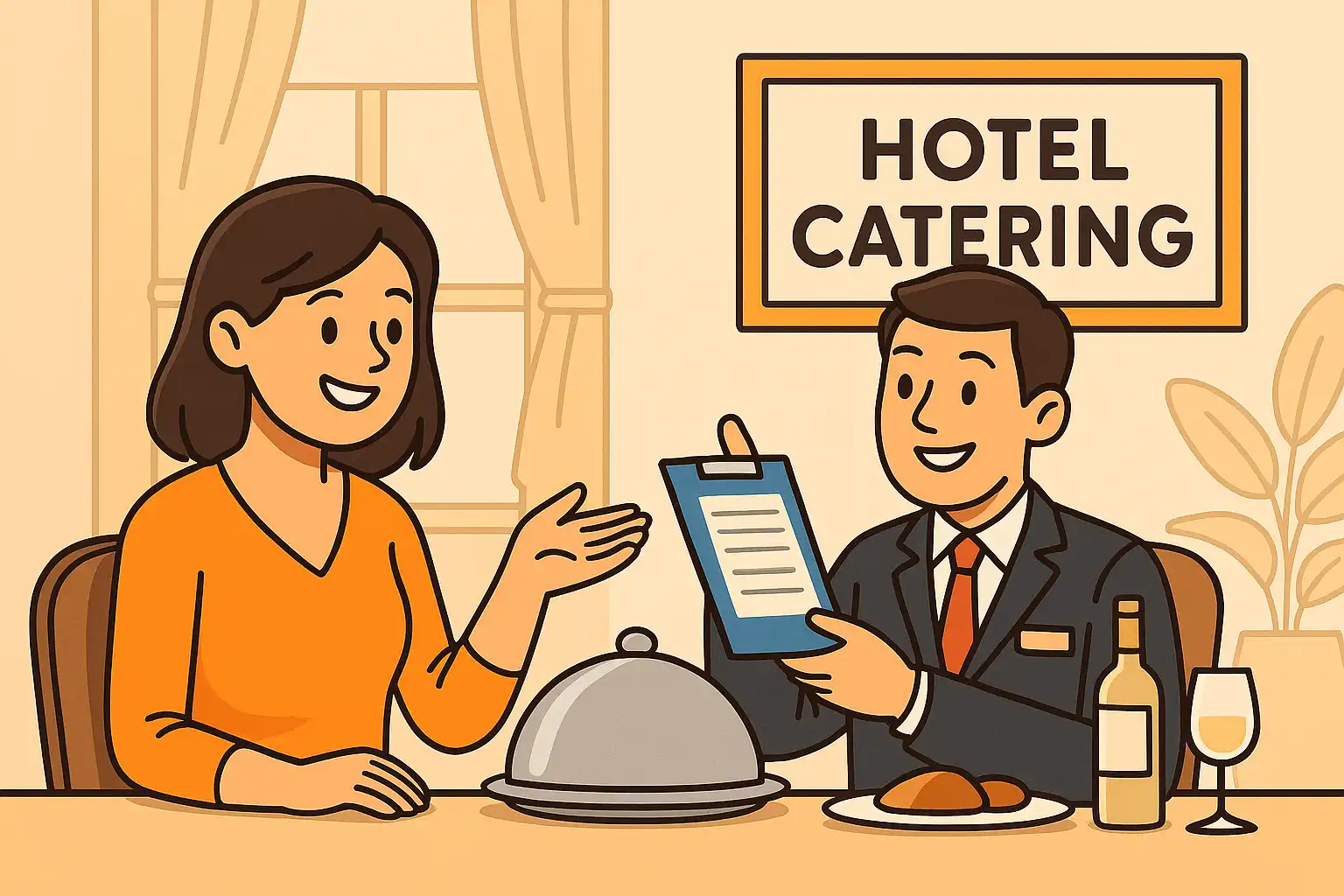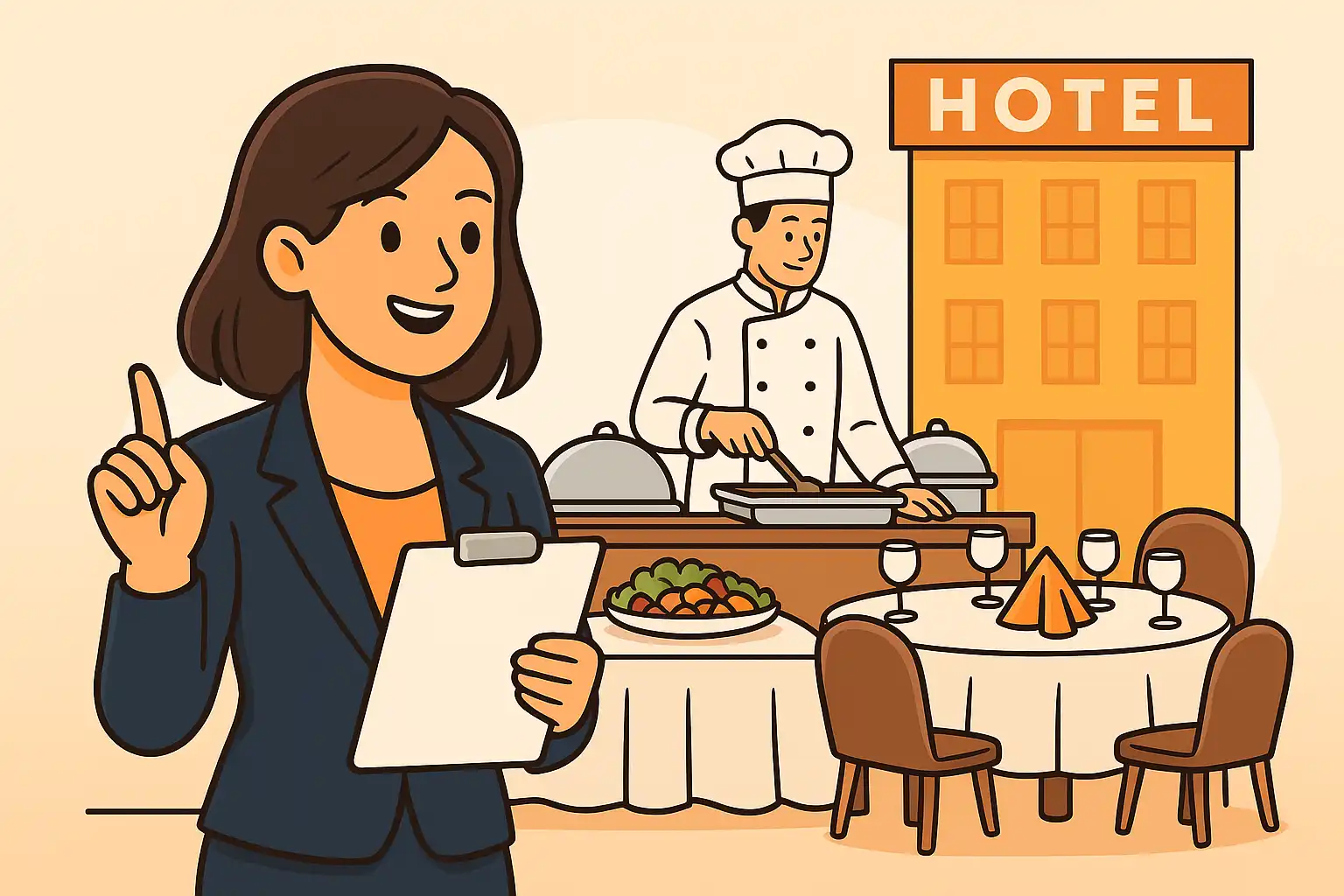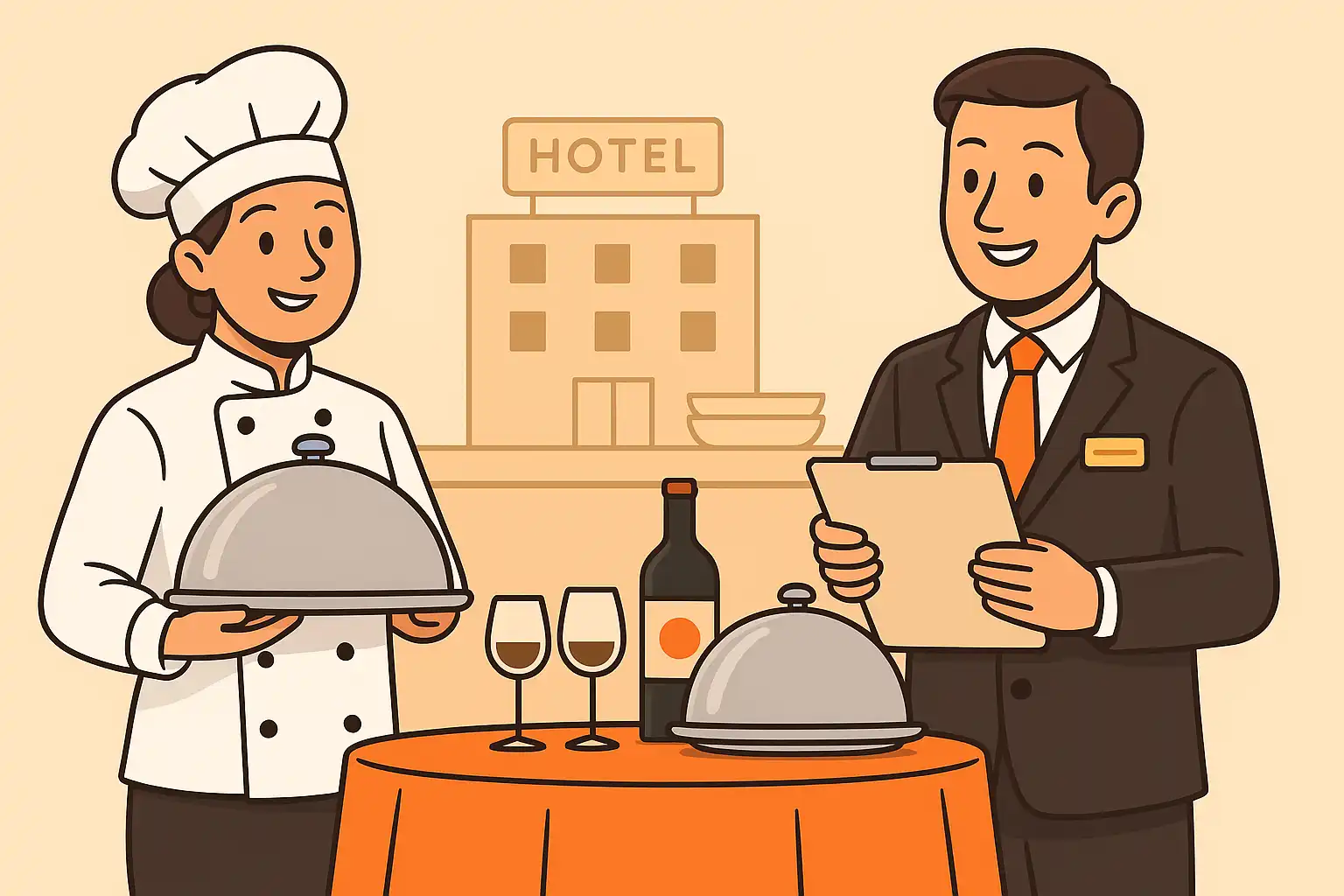Hotel Catering: A Complete Guide for Modern Hoteliers
 Mika Takahashi
Mika Takahashi Mika Takahashi
Mika TakahashiIn today’s hospitality world, hotel catering isn’t just a side service—it’s a key driver of guest satisfaction and revenue. You want your catering operations to deliver memorable dining experiences while also boosting your bottom line. That means smart planning and flawless execution.
Hotel catering offers a real chance to set your property apart and open new revenue streams. Whether it’s a small business meeting or a large wedding, catering services add value by complementing your hotel’s core offerings. More importantly, they build lasting client relationships grounded in quality, reliability, and creativity.
This guide breaks down what you need to know about hotel catering—from the basics and current trends to strategies that maximize revenue and operational best practices. Our goal is to help you turn your catering operation into a competitive advantage, not just another line item on your service list.

Hotel catering covers all food and beverage services designed to serve your guests and host events, whether on-site or off-site. Unlike your regular restaurant, catering demands detailed planning and coordination to meet diverse client needs while keeping quality consistent.
The market for hotel catering packages is growing fast, with global revenues expected to hit $16.2 billion by 2026. This growth is driven by the rising demand for experiential dining, hotel corporate events, and destination celebrations that require professional catering expertise.
Here’s a practical insight: hotels with strong catering services consistently score higher in guest satisfaction. Guests appreciate having varied dining options that match their event vision, and they’re often willing to pay a premium for it. For full-service hotels, catering can contribute 15-30% of total income—a significant chunk that you can’t afford to overlook.
Standing out in today’s crowded hospitality market means offering catering options that reflect local tastes and innovative culinary approaches. Customizing your catering menus and services can turn your hotel into a preferred venue for repeat clients and referrals.
Running a successful hotel catering operation boils down to a few core elements that work together to deliver quality, efficiency, and guest satisfaction.
Your menu is the heart of your catering. It should showcase your hotel’s brand and local flavors while balancing familiar favorites with creative dishes. Knowing your audience is key: corporate clients often want lighter, health-conscious meals to keep energy up during meetings, while social events might call for indulgent dishes that encourage mingling and celebration.
Seasonal menu changes keep things fresh and let you take advantage of peak ingredient availability. Work closely with local suppliers to ensure you get quality ingredients that fit your budget without compromising taste.
Quality control is non-negotiable. Standardized recipes, portion controls, and temperature checks keep your food safe and delicious, no matter the event size.
Portion sizes also matter. For example, business lunch portions should be satisfying but not heavy, so guests stay alert. Meanwhile, wedding receptions often need more generous servings to match the festive vibe.
Your catering staff are the face of your operation. Professional service standards set you apart and reflect your hotel’s values. Every team member should know their role and be trained in food safety, presentation, and guest interaction.
Coordination is crucial. Before events, briefings ensure kitchen, service, and planning teams are aligned on timing and special requests. Handling last-minute dietary changes or guest needs requires flexibility and calm professionalism.
Remember: the little touches make a big difference. Training your staff to anticipate guest needs and add personalized gestures can turn good service into memorable moments.

Guest expectations are shifting fast. To stay competitive, your catering needs to evolve with these trends.
Plant-based meals now make up about 35% of catering requests. Offering creative, tasty plant-based dishes appeals not only to vegetarians but also to omnivores looking for lighter options.
Gluten-free, keto, and allergen-friendly meals are no longer extras—they’re essentials. Your kitchen should have protocols to avoid cross-contamination while keeping dishes appealing and flavorful.
Transparency around nutrition helps guests make informed choices. Providing detailed ingredient lists and calorie counts builds trust and shows you care about their wellness.
Local, organic ingredients are also in demand. Highlighting your partnerships with nearby farms tells a story that resonates with guests who value sustainability.
Wellness drinks like kombucha, fresh juices, and herbal teas complement these menus and offer alternatives to traditional alcoholic beverages.
Zero-waste initiatives and compostable materials are becoming standard. They help reduce costs and show your commitment to the environment.
Working with suppliers within 100 miles supports local economies and cuts transportation emissions. Seasonal menus also reduce your carbon footprint and keep dishes fresh.
Cutting out single-use plastics might require upfront investment, but it sends a clear message to eco-conscious clients.
Food donation programs for leftover inventory can reduce waste and strengthen community ties. Plus, they may offer tax benefits.
Contactless ordering and QR code menus remain popular, offering convenience and hygiene benefits.
AI-driven inventory systems can cut food waste by up to 25%, saving money and reducing environmental impact.
Mobile apps for event planning and menu customization help clients collaborate with your team remotely, streamlining communication and reducing errors.
Digital payments and automated billing improve efficiency and give you better insights into your operations.
Virtual reality previews let clients visualize their events before committing, which can boost confidence and satisfaction.
Smart pricing, packaging, and market expansion can unlock new income streams and maximize your catering profitability.
Offer tiered packages to capture different market segments. Basic packages cover essentials at competitive prices, while premium tiers justify higher fees with enhanced experiences.
All-inclusive packages that bundle venue, catering, and AV simplify decisions and increase per-event revenue.
Seasonal promotions help fill your calendar during peak and slow times alike.
Upselling premium menu items or special services can boost revenue—train your staff to spot and suggest these opportunities naturally.
Group booking incentives encourage larger events and foster loyalty.
Expanding off-site catering grows your market beyond hotel guests. Mobile catering units for outdoor events can build brand awareness and revenue.
Partnering with local businesses and venues creates steady catering streams and comprehensive event solutions.
Adding delivery and equipment rental services diversifies income and supports your core operation.
Marketing should focus on reliability, expertise, and value to attract planners and hosts.

Consistent quality and efficiency come from solid kitchen management, food safety, and cost control.
Compliance with HACCP and food safety certifications protects your guests and your license.
Regular equipment maintenance and optimized workflows prevent disruptions and keep food quality high.
Temperature controls for storage and service ensure safety and taste.
Prevent cross-contamination with dedicated prep areas for allergen-free dishes.
Frequent health inspections and quality audits catch issues early and demonstrate your commitment to standards.
Just-in-time ordering keeps ingredients fresh and waste low but requires accurate forecasting.
Strong supplier relationships and competitive bidding help control costs without sacrificing quality.
Menu engineering ensures each dish contributes to profitability.
Portion control and recipe standardization maintain guest satisfaction and cost efficiency.
Tracking inventory turnover weekly helps identify areas for improvement.
Memorable catering is about more than food—it’s about understanding and exceeding guest expectations.
Use CRM data to tailor menus and accommodate special requests. This builds trust and repeat business.
Respect cultural and religious dietary needs to make all guests feel welcome.
Interactive planning sessions with clients ensure menus fit their vision and showcase your expertise.
Tasting events reduce uncertainty and often lead to upgraded menus.
Coordinate event space design and table settings to complement menus and themes.
Lighting and music should match the event mood—bright and energizing for corporate, warm and intimate for social.
Creative plating and garnishing add visual appeal and enhance enjoyment.
Live cooking stations and chef interactions entertain guests and highlight your culinary skills.
Encourage social sharing with photogenic dishes that guests want to post.
Hotel catering is evolving with technology, changing guest demographics, and new safety standards.
Robotic food service and AI menu planning promise efficiency and consistency gains.
Millennials and younger guests value authenticity, sustainability, and personalization over traditional luxury.
Post-pandemic safety protocols—like enhanced sanitization and contactless options—are now expected.
Certification programs and corporate sustainability requirements increasingly influence catering choices.
Virtual and hybrid event catering is growing, requiring new service approaches and staff training.
The key to future success? Balancing efficiency with personalized experiences, sustainability with profitability, and technology with a human touch.
When planning your catering menus, involve your front desk and housekeeping teams. They often hear guest preferences and feedback that can help you fine-tune your offerings and anticipate needs before the event.
Myth: Catering is just about food.
Reality: Catering is about the entire guest experience—from menu to service to atmosphere. Neglect any part, and the whole falls flat.
Hotel catering is no longer an afterthought—it’s a vital part of your property’s success. By focusing on quality menus, excellent service, sustainability, and smart operations, you can create memorable dining experiences that boost guest satisfaction and your bottom line.
With thoughtful planning and execution, your hotel catering can become a standout feature that guests remember—and pay for.